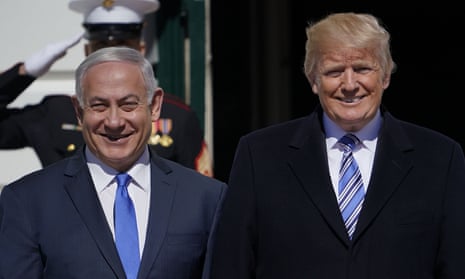Donald Trump has announced that the US will recognize Israel’s sovereignty over the Golan Heights, captured from Syria in 1967, in a dramatic move likely to bolster Benjamin Netanyahu’s hopes to win re-election, but which will also provoke international opposition.
Previous US administrations have treated Golan Heights as occupied Syrian territory, in line with UN security council resolutions. Trump declared his break with that policy, in a tweet on Thursday.
He said: “After 52 years it is time for the United States to fully recognize Israel’s sovereignty over the Golan Heights, which is of critical strategic and security importance to the State of Israel and Regional Stability!”
By defying a 52-year-old unanimously adopted UN resolution on “inadmissibility of the acquisition of territory by war”, Trump has also broken the postwar norm of refusing to recognise the forcible annexation of territory – which has underpinned western and international opposition to the Russian annexation of Crimea.
“The United States relies on these core principles regarding peaceful dispute resolution and rejecting acquisition of territory by force,” Tamara Cofman Wittes, the former deputy assistant secretary of state for Near Eastern affairs, wrote on Twitter. Wittes, now a senior fellow at the Brookings Institution, added the move “yanks the rug out from under US policy opposing Russia’s annexation of Crimea, as well as US views on other disputed territories”.
Netanyahu, the Israeli PM, quickly tweeted his gratitude for Trump’s gesture.
“At a time when Iran seeks to use Syria as a platform to destroy Israel, President Trump boldly recognizes Israeli sovereignty over the Golan Heights,” the Israeli prime minister wrote. “Thank you President Trump!”
The Syrian state news agency issued a statement saying Golan Heights remained Arabian and Syrian regardless of Trump’s comments.
The announcement came as Netanyahu was hosting the US secretary of state, Mike Pompeo, in Jerusalem.
“President Trump has just made history,” Netanyahu said. “I called him. I thanked him on behalf of the people of Israel. The message that President Trump has given the world is that America stands by Israel.”
Pompeo said: “President Trump tonight made the decision to recognise that hard-fought real estate, that important place is proper to be sovereign part of the state of Israel.”
He added: “The people of Israel should know that the battles they fought, the lives that they lost on that very ground, were worthy, meaningful and important for all time.”
The announcement marks a diplomatic coup for Netanyahu, less than three weeks before a close fought election, and four days before he is due to visit Washington.
Trump denied his announcement was intended to help Netanyahu hold on to office, even suggesting he had been unaware the election was imminent.
“I wouldn’t even know about that. I have no idea,” Trump told Fox News. He said he had been thinking about recognising the Israeli annexation “for a long time”.
“This is sovereignty, this is security, this is about regional security,” he said.
Administration officials had previously rebuffed Netanyahu’s pressure for recognition of Israel’s possession of the strategic border area, pointing out that Trump had already handed the Israeli leader a significant political gift by moving the US embassy in Israel from Tel Aviv to Jerusalem.
Recognition of the Golan could pave the way for US recognition of Israeli sovereignty in the Palestinian occupied territories. In a recent state department report on human rights, the administration changed its description of the West Bank and Gaza from “occupied territories” to “Israeli-controlled territories”.
Robert Malley, a former Middle East adviser to Barack Obama and now head of the International Crisis Group, said: “This decision is intensely political – timed to boost Netanyahu’s electoral chances; gratuitous – it will not alter in any way Israel’s control of the Golan Heights; in disregard of international law; and an ominous step at a time when voices in Israel calling for the annexation of the West Bank are growing louder.”
He added: “It is of a piece with the administration’s one-sided Mideast policy and confirms that its goal is not Arab-Israeli peace but a fundamental redrawing of the parameters that have governed its pursuit.”
Israel advanced into the Golan Heights gradually in the years following the 1948 war Arab-Israeli war, and occupied it entirely in the 1967 war. That year, UN security council resolution 242 stressed the “inadmissibility of the acquisition of territory by war and the need to work for a just and lasting peace in which every state in the area can live in security”.
A further resolution, supported by the Reagan administration in 1981, rejected as “null and void” a move to put the area under direct Israeli jurisdiction.
Over the decades there have been a string of abortive attempts to negotiate a peaceful solution to the fate of the Golan Heights – most recently in 2010 when the Obama administration and Netanyahu engaged in secret talks with the Syrian dictator, Bashar al-Assad, on a peace treaty involving Israeli withdrawal.
But that effort foundered with the spread of the Arab Spring revolt to Syria, and Assad’s decision to crush the rebellion by massacring protesters in 2011.
Frederic Hof, a former senior state department official involved in those negotiations, told the Guardian on Thursday that annexation “would be an entirely gratuitous gesture with potential diplomatic downsides for Israel and for the security of Israelis”.
Hof said: “It will be welcomed by Israel’s bitterest enemies – Iran and Hezbollah – who would see annexation as additional justification for terror operations. It would enable Syria’s Assad regime to change the subject from its war crimes and crimes against humanity to Israel’s formal acquisition of territory in violation of UN security council resolution 242. It would do nothing whatsoever positive for Israel’s security.”
